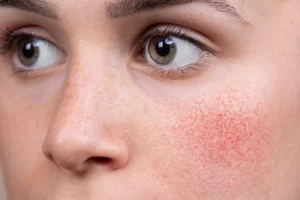Introduction
Our skin is not just a protective outer layer; it’s a dynamic organ that can be affected by various skin diseases. These conditions range from minor irritations to chronic ailments that impact not only our physical health but also our self-esteem. Understanding these skin diseases, their causes, symptoms, and treatments is crucial for maintaining healthy and radiant skin. In this comprehensive guide, we’ll peel back the layers of various skin ailments, providing you with valuable insights to recognize, address, and seek appropriate treatment for different skin conditions. Let’s embark on a journey to unveil the mysteries of skin diseases.
The Skin’s Complex Structure
Before we delve into specific skin diseases, let’s lay the foundation by understanding the intricate structure of the skin:
1. The Three Primary Layers of Skin
The skin comprises three primary layers, each with its unique functions:
- Epidermis: The outermost layer, responsible for protecting against environmental factors.
- Dermis: The middle layer containing hair follicles, sweat glands, and blood vessels.
- Subcutaneous Tissue: The innermost layer that houses fat cells, providing insulation and cushioning.
2. Common Skin Issues
Skin problems can range from mild to severe and are often encountered in our daily lives. Some of the common skin issues include:
- Acne: Characterized by pimples, blackheads, and whiteheads, commonly occurring during adolescence.
- Eczema (Dermatitis): An inflammatory skin condition causing itching, redness, and rashes.
- Psoriasis: An autoimmune disease leading to scaly, raised patches of skin.
- Rosacea: A chronic skin condition causing facial redness, visible blood vessels, and acne-like bumps.
- Skin Cancer: Abnormal growth of skin cells, including melanoma, basal cell carcinoma, and squamous cell carcinoma.
In-Depth Exploration of Skin Diseases
Let’s delve into specific skin diseases, gaining a deeper understanding of their causes, symptoms, and available treatments:
1. Acne
Causes:
- Overproduction of sebum (skin oil).
- Clogged hair follicles.
- Bacterial growth (Propionibacterium acnes).
Symptoms:
- Pimples (whiteheads, blackheads).
- Inflamed papules and pustules.
- Painful nodules or cysts.
Treatments:
- Topical creams (retinoids, benzoyl peroxide).
- Oral antibiotics.
- Hormonal therapy (for hormonal acne).
- Chemical peels or laser therapy.
2. Eczema (Dermatitis)
Causes:
- Genetic factors.
- Exposure to allergens or irritants.
- Abnormal immune response.
Symptoms:
- Itching.
- Redness.
- Dry, scaly skin.
- Rash.
Treatments:
- Moisturizers and emollients.
- Topical corticosteroids.
- Antihistamines.
- Phototherapy (UV therapy).
3. Psoriasis
Causes:
- Genetic predisposition.
- Immune system dysfunction.
- Triggers like stress or infections.
Symptoms:
- Red, scaly patches.
- Itching and burning.
- Thickened nails.
- Joint pain (in some types).
Treatments:
- Topical corticosteroids.
- Phototherapy.
- Systemic medications (immunosuppressants).
- Biologic drugs.
4. Rosacea
Causes:
- Genetic factors.
- Vascular abnormalities.
- Triggers like sun exposure or spicy foods.
Symptoms:
- Facial redness (flushing).
- Visible blood vessels.
- Acne-like bumps.
- Eye irritation (in ocular rosacea).
Treatments:
- Topical or oral antibiotics.
- Topical creams (azelaic acid).
- Laser therapy (for visible blood vessels).
- Avoidance of triggers.

Image by: https://www.schweigerderm.com/
5. Skin Cancer
Causes:
- Prolonged exposure to UV radiation (sunlight or tanning beds).
- Genetic predisposition.
- Weakened immune system.
Symptoms:
- Unusual moles or growths.
- Changes in the appearance of existing moles.
- Skin sores that don’t heal.
Treatments:
- Surgical procedures (excision, Mohs surgery).
- Radiation therapy.
- Chemotherapy or immunotherapy (for advanced cases).
- Targeted therapy (for specific skin cancers).
Prevention and Skin Health Tips
Maintaining healthy skin and preventing skin diseases is crucial. Here are some tips for promoting skin health:
- Daily Skin Care: Establish a consistent skincare routine with cleansing, moisturizing, and sun protection.
- Sun Protection: Use sunscreen with a high SPF, wear protective clothing, and minimize sun exposure during peak hours.
- Hydration: Stay well-hydrated to maintain skin moisture from within.
- Healthy Diet: Consume a balanced diet rich in antioxidants, vitamins, and minerals.
- Stress Management: Practice stress-reduction techniques such as meditation or yoga.
- Avoid Irritants: Be cautious with skincare products and avoid harsh chemicals or known allergens.
- Regular Check-ups: Schedule periodic skin examinations with a dermatologist for early detection and prevention.
Conclusion
Congratulations! You’ve embarked on a journey to unveil the mysteries of different skin diseases, gaining an understanding of their causes, symptoms, and treatments. Skin health is an integral aspect of overall well-being, and this guide equips you with the knowledge to recognize, address, and prioritize your skin’s health effectively.
In this comprehensive guide, we’ve explored the skin’s complex structure, common skin issues, and specific skin diseases, including acne, eczema, psoriasis, rosacea, and skin cancer. Additionally, we’ve provided essential tips for preventing these conditions and promoting vibrant and healthy skin.
As you continue your journey toward maintaining healthy skin, remember that early detection, appropriate treatment, and proactive prevention are your best allies. Prioritize your skin health, and it will reward you with a radiant and healthy appearance, enhancing your overall quality of life.












